LAW8500 - Australian Commercial and Corporations Law Assignment
VerifiedAdded on 2022/08/23
|7
|1525
|42
Homework Assignment
AI Summary
This document presents a comprehensive solution to a business law assignment, specifically addressing the formation of a unilateral contract. The assignment analyzes a scenario involving an advertisement by Bonza Beer offering a reward for catching a fish. The solution identifies the key legal issues, including offer, acceptance, and consideration, and applies relevant case law, such as Carlill v Carbolic Smoke Ball Company. The solution explores the elements of a valid contract, including the intention of parties and their capacity, to determine whether a contract was formed between Bonza Beer and an individual named Gordon. The document thoroughly examines the facts, applies legal principles, and provides a reasoned conclusion, ultimately determining the liability of Bonza Beer. The assignment utilizes the ILAC method (Issue, Laws, Application, Conclusion) to provide a structured and logical analysis of the legal problem, making it a valuable resource for students studying contract law and commercial law.
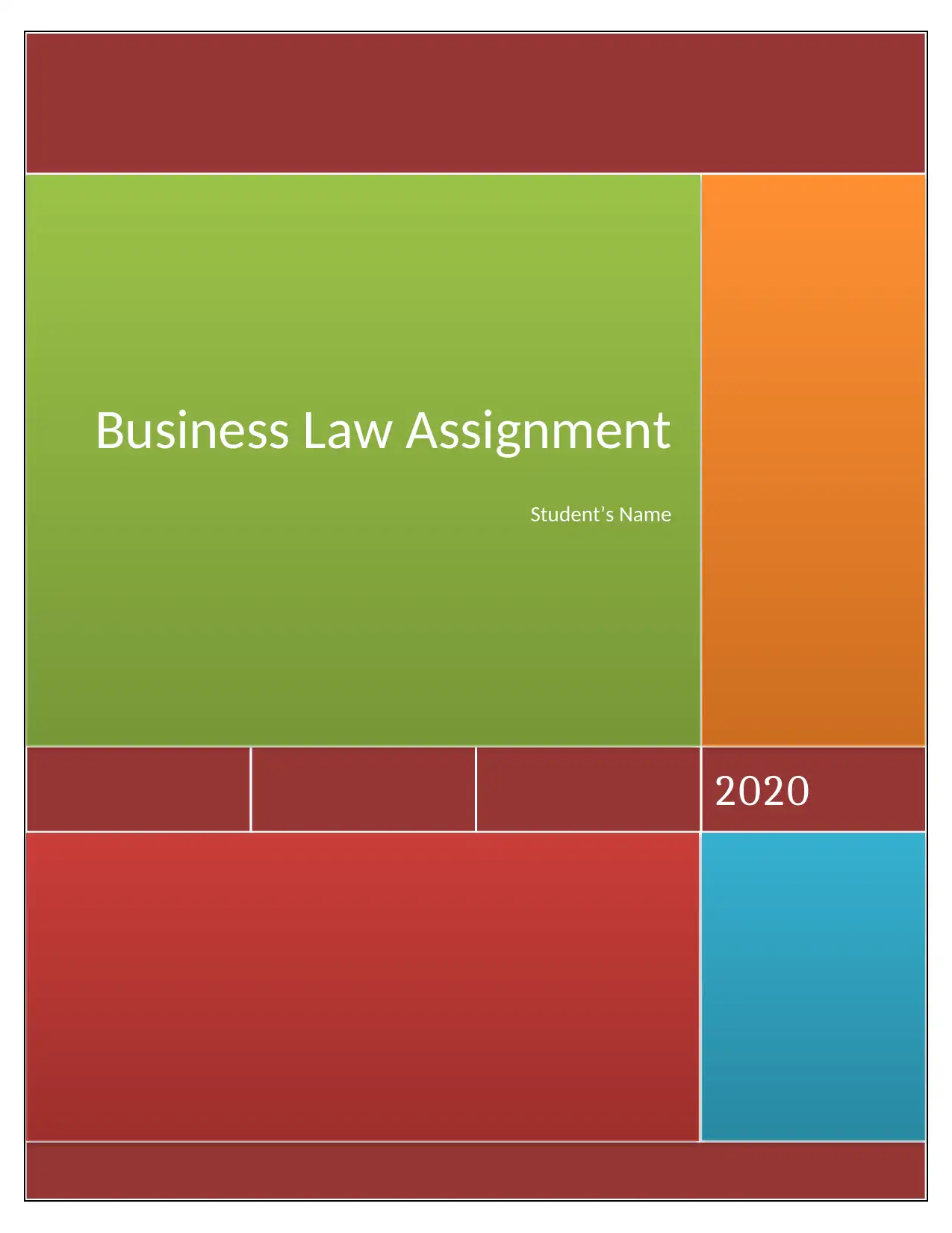
2020
Business Law Assignment
Student’s Name
Business Law Assignment
Student’s Name
Paraphrase This Document
Need a fresh take? Get an instant paraphrase of this document with our AI Paraphraser
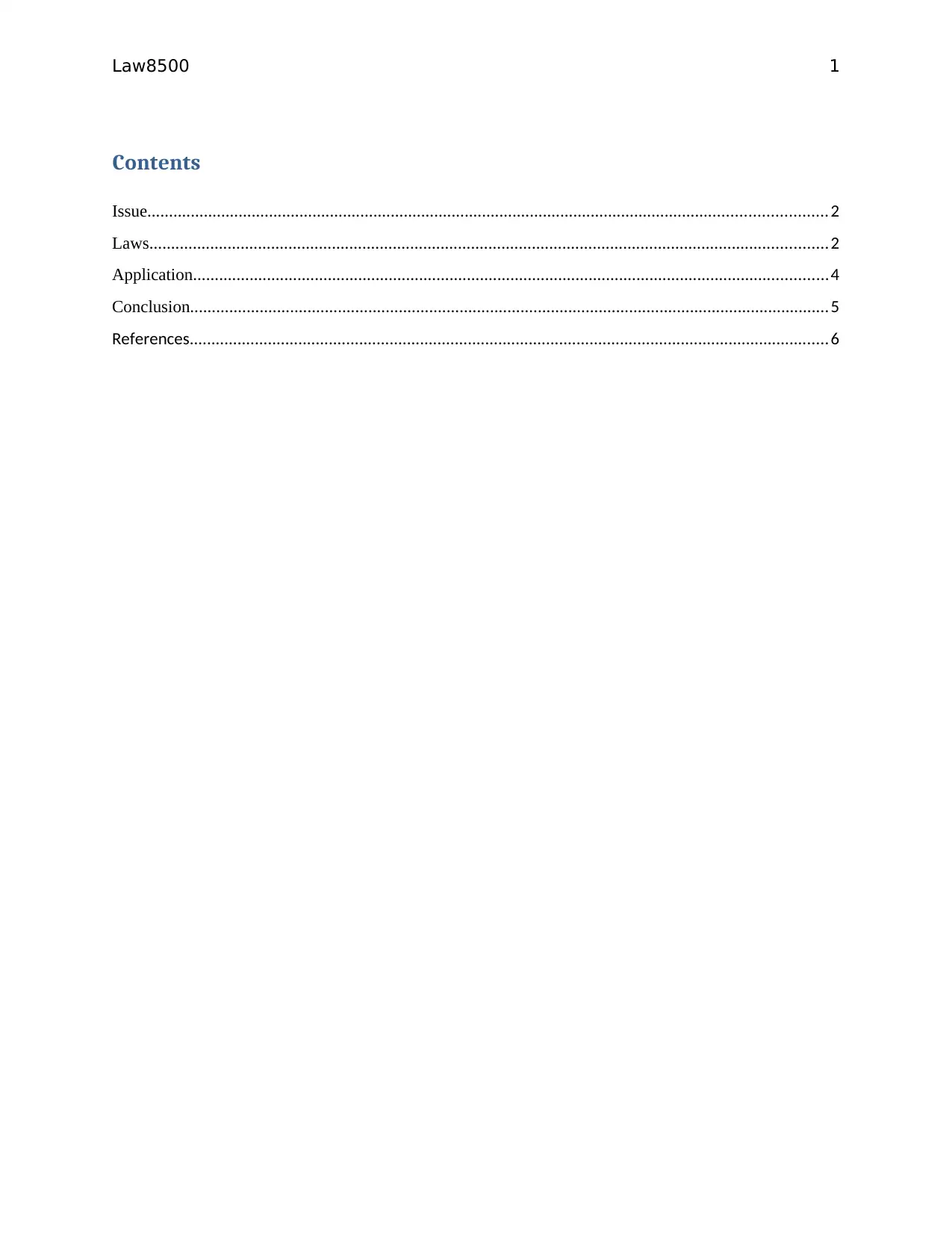
Law8500 1
Contents
Issue............................................................................................................................................................2
Laws............................................................................................................................................................2
Application..................................................................................................................................................4
Conclusion...................................................................................................................................................5
References...................................................................................................................................................6
Contents
Issue............................................................................................................................................................2
Laws............................................................................................................................................................2
Application..................................................................................................................................................4
Conclusion...................................................................................................................................................5
References...................................................................................................................................................6
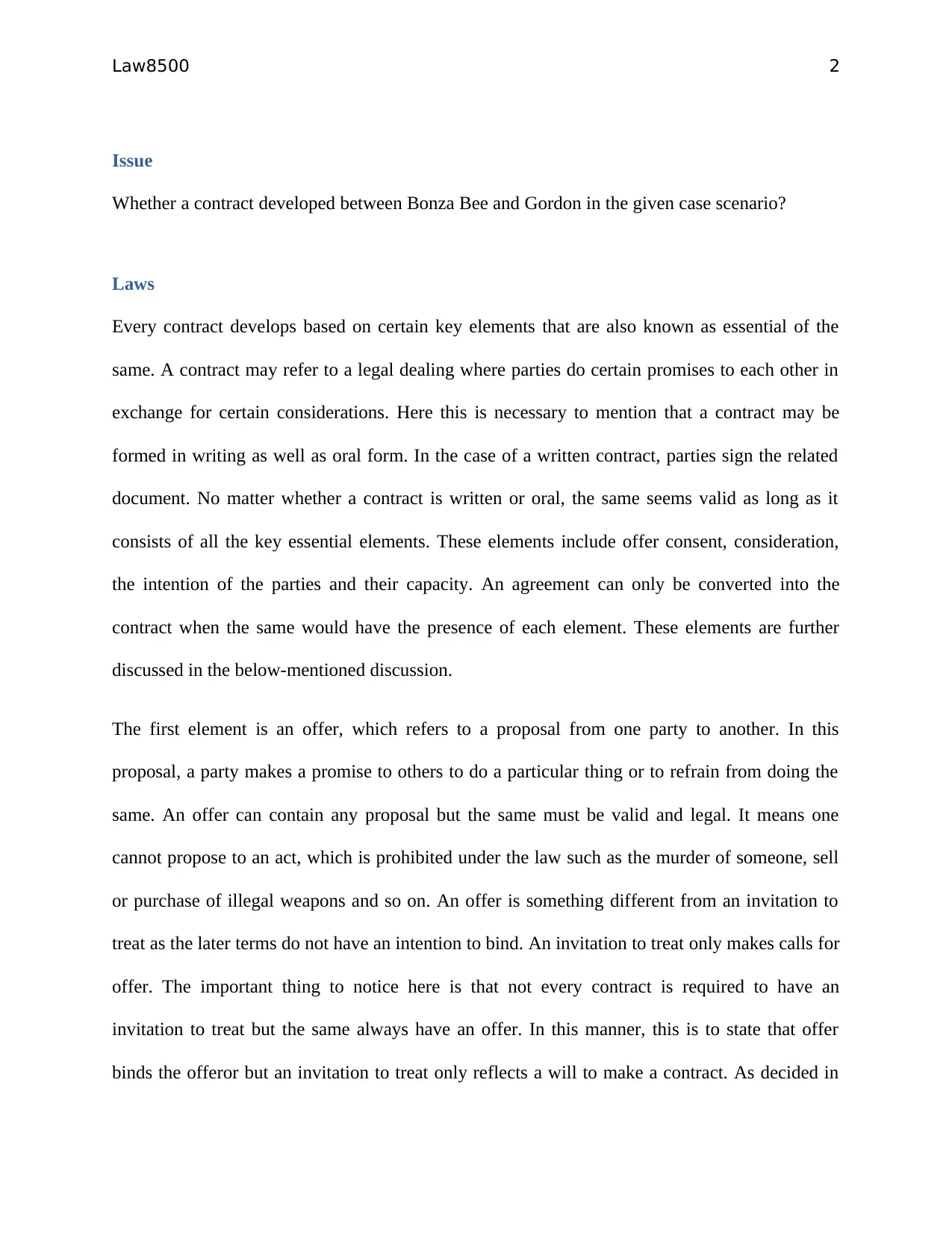
Law8500 2
Issue
Whether a contract developed between Bonza Bee and Gordon in the given case scenario?
Laws
Every contract develops based on certain key elements that are also known as essential of the
same. A contract may refer to a legal dealing where parties do certain promises to each other in
exchange for certain considerations. Here this is necessary to mention that a contract may be
formed in writing as well as oral form. In the case of a written contract, parties sign the related
document. No matter whether a contract is written or oral, the same seems valid as long as it
consists of all the key essential elements. These elements include offer consent, consideration,
the intention of the parties and their capacity. An agreement can only be converted into the
contract when the same would have the presence of each element. These elements are further
discussed in the below-mentioned discussion.
The first element is an offer, which refers to a proposal from one party to another. In this
proposal, a party makes a promise to others to do a particular thing or to refrain from doing the
same. An offer can contain any proposal but the same must be valid and legal. It means one
cannot propose to an act, which is prohibited under the law such as the murder of someone, sell
or purchase of illegal weapons and so on. An offer is something different from an invitation to
treat as the later terms do not have an intention to bind. An invitation to treat only makes calls for
offer. The important thing to notice here is that not every contract is required to have an
invitation to treat but the same always have an offer. In this manner, this is to state that offer
binds the offeror but an invitation to treat only reflects a will to make a contract. As decided in
Issue
Whether a contract developed between Bonza Bee and Gordon in the given case scenario?
Laws
Every contract develops based on certain key elements that are also known as essential of the
same. A contract may refer to a legal dealing where parties do certain promises to each other in
exchange for certain considerations. Here this is necessary to mention that a contract may be
formed in writing as well as oral form. In the case of a written contract, parties sign the related
document. No matter whether a contract is written or oral, the same seems valid as long as it
consists of all the key essential elements. These elements include offer consent, consideration,
the intention of the parties and their capacity. An agreement can only be converted into the
contract when the same would have the presence of each element. These elements are further
discussed in the below-mentioned discussion.
The first element is an offer, which refers to a proposal from one party to another. In this
proposal, a party makes a promise to others to do a particular thing or to refrain from doing the
same. An offer can contain any proposal but the same must be valid and legal. It means one
cannot propose to an act, which is prohibited under the law such as the murder of someone, sell
or purchase of illegal weapons and so on. An offer is something different from an invitation to
treat as the later terms do not have an intention to bind. An invitation to treat only makes calls for
offer. The important thing to notice here is that not every contract is required to have an
invitation to treat but the same always have an offer. In this manner, this is to state that offer
binds the offeror but an invitation to treat only reflects a will to make a contract. As decided in
⊘ This is a preview!⊘
Do you want full access?
Subscribe today to unlock all pages.

Trusted by 1+ million students worldwide
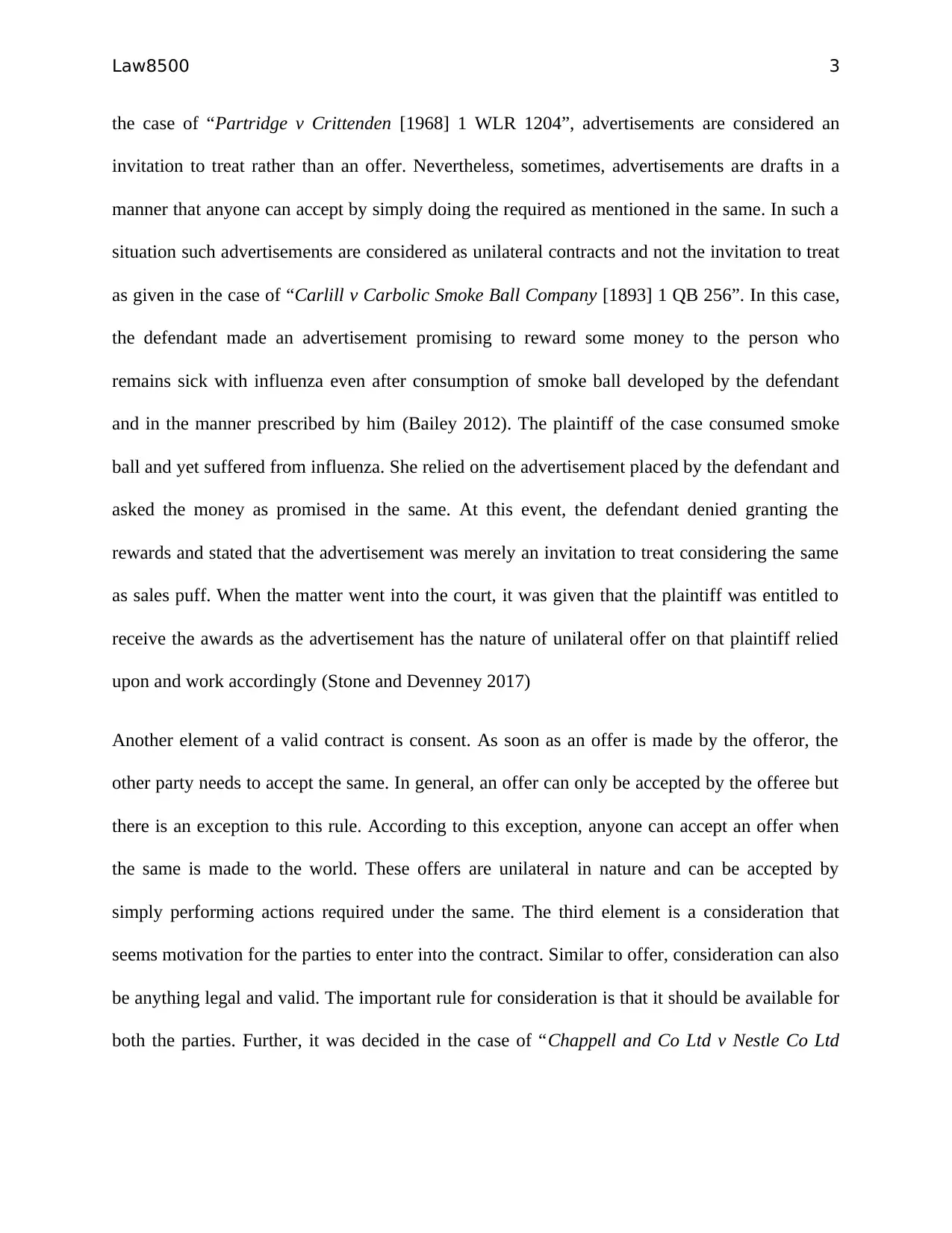
Law8500 3
the case of “Partridge v Crittenden [1968] 1 WLR 1204”, advertisements are considered an
invitation to treat rather than an offer. Nevertheless, sometimes, advertisements are drafts in a
manner that anyone can accept by simply doing the required as mentioned in the same. In such a
situation such advertisements are considered as unilateral contracts and not the invitation to treat
as given in the case of “Carlill v Carbolic Smoke Ball Company [1893] 1 QB 256”. In this case,
the defendant made an advertisement promising to reward some money to the person who
remains sick with influenza even after consumption of smoke ball developed by the defendant
and in the manner prescribed by him (Bailey 2012). The plaintiff of the case consumed smoke
ball and yet suffered from influenza. She relied on the advertisement placed by the defendant and
asked the money as promised in the same. At this event, the defendant denied granting the
rewards and stated that the advertisement was merely an invitation to treat considering the same
as sales puff. When the matter went into the court, it was given that the plaintiff was entitled to
receive the awards as the advertisement has the nature of unilateral offer on that plaintiff relied
upon and work accordingly (Stone and Devenney 2017)
Another element of a valid contract is consent. As soon as an offer is made by the offeror, the
other party needs to accept the same. In general, an offer can only be accepted by the offeree but
there is an exception to this rule. According to this exception, anyone can accept an offer when
the same is made to the world. These offers are unilateral in nature and can be accepted by
simply performing actions required under the same. The third element is a consideration that
seems motivation for the parties to enter into the contract. Similar to offer, consideration can also
be anything legal and valid. The important rule for consideration is that it should be available for
both the parties. Further, it was decided in the case of “Chappell and Co Ltd v Nestle Co Ltd
the case of “Partridge v Crittenden [1968] 1 WLR 1204”, advertisements are considered an
invitation to treat rather than an offer. Nevertheless, sometimes, advertisements are drafts in a
manner that anyone can accept by simply doing the required as mentioned in the same. In such a
situation such advertisements are considered as unilateral contracts and not the invitation to treat
as given in the case of “Carlill v Carbolic Smoke Ball Company [1893] 1 QB 256”. In this case,
the defendant made an advertisement promising to reward some money to the person who
remains sick with influenza even after consumption of smoke ball developed by the defendant
and in the manner prescribed by him (Bailey 2012). The plaintiff of the case consumed smoke
ball and yet suffered from influenza. She relied on the advertisement placed by the defendant and
asked the money as promised in the same. At this event, the defendant denied granting the
rewards and stated that the advertisement was merely an invitation to treat considering the same
as sales puff. When the matter went into the court, it was given that the plaintiff was entitled to
receive the awards as the advertisement has the nature of unilateral offer on that plaintiff relied
upon and work accordingly (Stone and Devenney 2017)
Another element of a valid contract is consent. As soon as an offer is made by the offeror, the
other party needs to accept the same. In general, an offer can only be accepted by the offeree but
there is an exception to this rule. According to this exception, anyone can accept an offer when
the same is made to the world. These offers are unilateral in nature and can be accepted by
simply performing actions required under the same. The third element is a consideration that
seems motivation for the parties to enter into the contract. Similar to offer, consideration can also
be anything legal and valid. The important rule for consideration is that it should be available for
both the parties. Further, it was decided in the case of “Chappell and Co Ltd v Nestle Co Ltd
Paraphrase This Document
Need a fresh take? Get an instant paraphrase of this document with our AI Paraphraser
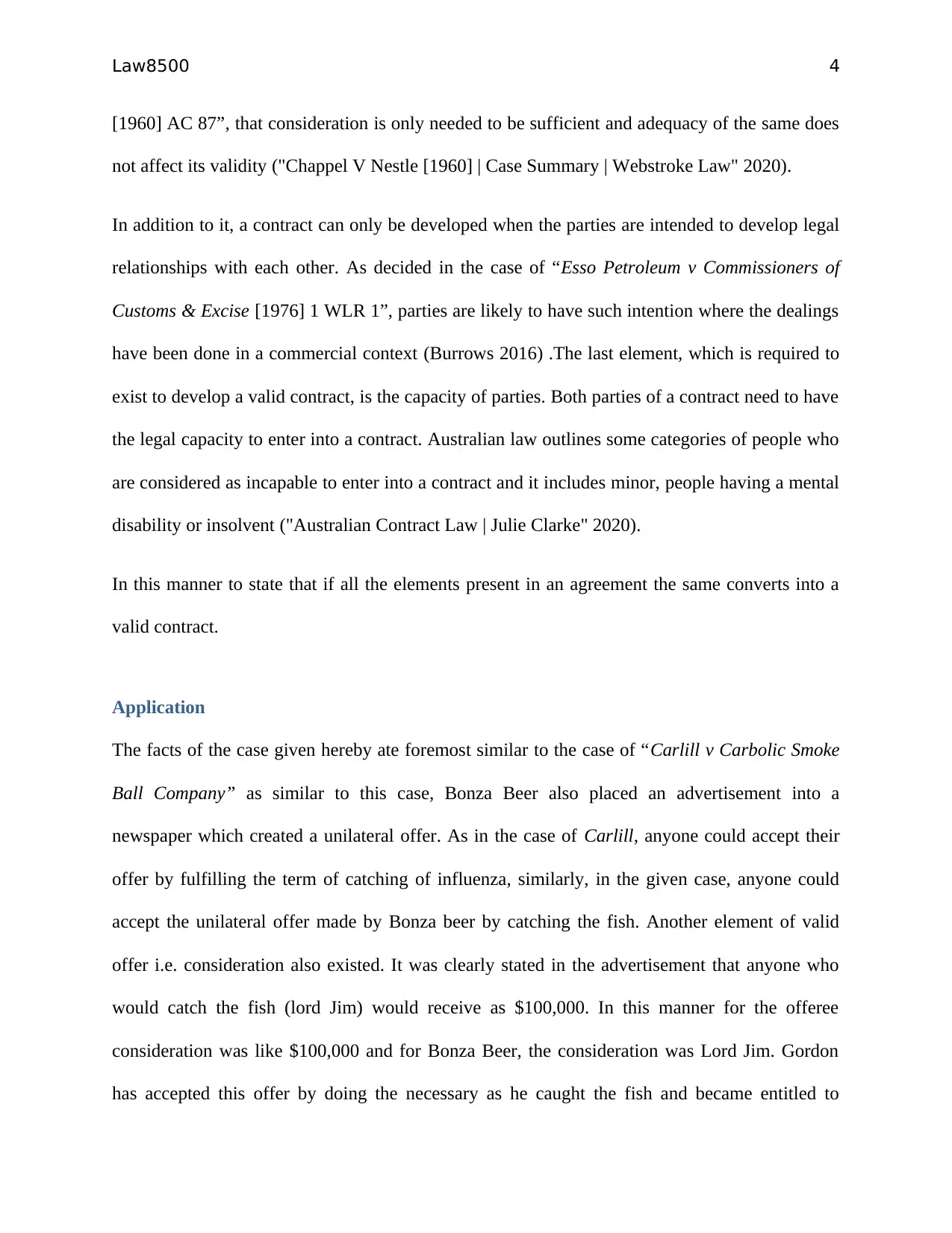
Law8500 4
[1960] AC 87”, that consideration is only needed to be sufficient and adequacy of the same does
not affect its validity ("Chappel V Nestle [1960] | Case Summary | Webstroke Law" 2020).
In addition to it, a contract can only be developed when the parties are intended to develop legal
relationships with each other. As decided in the case of “Esso Petroleum v Commissioners of
Customs & Excise [1976] 1 WLR 1”, parties are likely to have such intention where the dealings
have been done in a commercial context (Burrows 2016) .The last element, which is required to
exist to develop a valid contract, is the capacity of parties. Both parties of a contract need to have
the legal capacity to enter into a contract. Australian law outlines some categories of people who
are considered as incapable to enter into a contract and it includes minor, people having a mental
disability or insolvent ("Australian Contract Law | Julie Clarke" 2020).
In this manner to state that if all the elements present in an agreement the same converts into a
valid contract.
Application
The facts of the case given hereby ate foremost similar to the case of “Carlill v Carbolic Smoke
Ball Company” as similar to this case, Bonza Beer also placed an advertisement into a
newspaper which created a unilateral offer. As in the case of Carlill, anyone could accept their
offer by fulfilling the term of catching of influenza, similarly, in the given case, anyone could
accept the unilateral offer made by Bonza beer by catching the fish. Another element of valid
offer i.e. consideration also existed. It was clearly stated in the advertisement that anyone who
would catch the fish (lord Jim) would receive as $100,000. In this manner for the offeree
consideration was like $100,000 and for Bonza Beer, the consideration was Lord Jim. Gordon
has accepted this offer by doing the necessary as he caught the fish and became entitled to
[1960] AC 87”, that consideration is only needed to be sufficient and adequacy of the same does
not affect its validity ("Chappel V Nestle [1960] | Case Summary | Webstroke Law" 2020).
In addition to it, a contract can only be developed when the parties are intended to develop legal
relationships with each other. As decided in the case of “Esso Petroleum v Commissioners of
Customs & Excise [1976] 1 WLR 1”, parties are likely to have such intention where the dealings
have been done in a commercial context (Burrows 2016) .The last element, which is required to
exist to develop a valid contract, is the capacity of parties. Both parties of a contract need to have
the legal capacity to enter into a contract. Australian law outlines some categories of people who
are considered as incapable to enter into a contract and it includes minor, people having a mental
disability or insolvent ("Australian Contract Law | Julie Clarke" 2020).
In this manner to state that if all the elements present in an agreement the same converts into a
valid contract.
Application
The facts of the case given hereby ate foremost similar to the case of “Carlill v Carbolic Smoke
Ball Company” as similar to this case, Bonza Beer also placed an advertisement into a
newspaper which created a unilateral offer. As in the case of Carlill, anyone could accept their
offer by fulfilling the term of catching of influenza, similarly, in the given case, anyone could
accept the unilateral offer made by Bonza beer by catching the fish. Another element of valid
offer i.e. consideration also existed. It was clearly stated in the advertisement that anyone who
would catch the fish (lord Jim) would receive as $100,000. In this manner for the offeree
consideration was like $100,000 and for Bonza Beer, the consideration was Lord Jim. Gordon
has accepted this offer by doing the necessary as he caught the fish and became entitled to
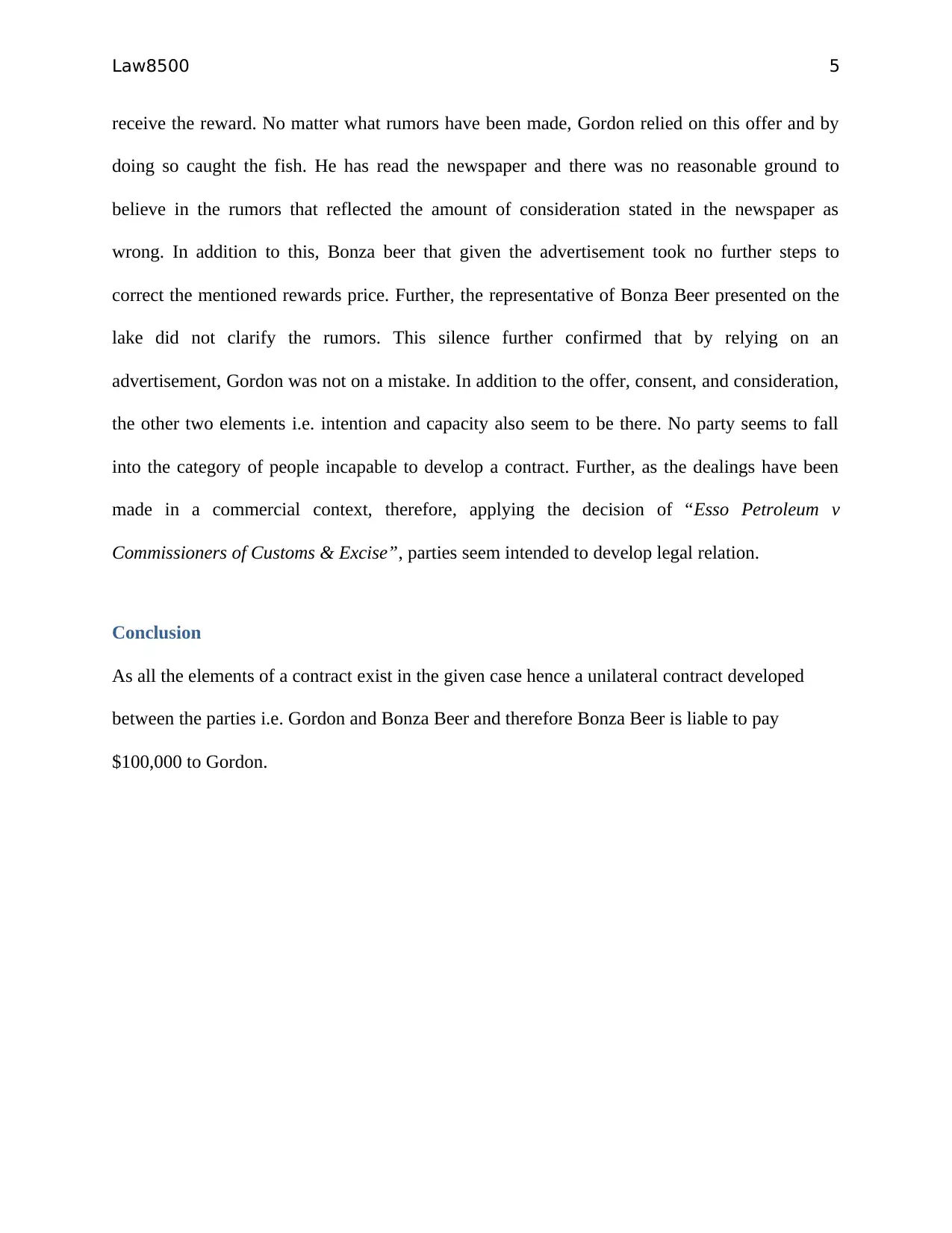
Law8500 5
receive the reward. No matter what rumors have been made, Gordon relied on this offer and by
doing so caught the fish. He has read the newspaper and there was no reasonable ground to
believe in the rumors that reflected the amount of consideration stated in the newspaper as
wrong. In addition to this, Bonza beer that given the advertisement took no further steps to
correct the mentioned rewards price. Further, the representative of Bonza Beer presented on the
lake did not clarify the rumors. This silence further confirmed that by relying on an
advertisement, Gordon was not on a mistake. In addition to the offer, consent, and consideration,
the other two elements i.e. intention and capacity also seem to be there. No party seems to fall
into the category of people incapable to develop a contract. Further, as the dealings have been
made in a commercial context, therefore, applying the decision of “Esso Petroleum v
Commissioners of Customs & Excise”, parties seem intended to develop legal relation.
Conclusion
As all the elements of a contract exist in the given case hence a unilateral contract developed
between the parties i.e. Gordon and Bonza Beer and therefore Bonza Beer is liable to pay
$100,000 to Gordon.
receive the reward. No matter what rumors have been made, Gordon relied on this offer and by
doing so caught the fish. He has read the newspaper and there was no reasonable ground to
believe in the rumors that reflected the amount of consideration stated in the newspaper as
wrong. In addition to this, Bonza beer that given the advertisement took no further steps to
correct the mentioned rewards price. Further, the representative of Bonza Beer presented on the
lake did not clarify the rumors. This silence further confirmed that by relying on an
advertisement, Gordon was not on a mistake. In addition to the offer, consent, and consideration,
the other two elements i.e. intention and capacity also seem to be there. No party seems to fall
into the category of people incapable to develop a contract. Further, as the dealings have been
made in a commercial context, therefore, applying the decision of “Esso Petroleum v
Commissioners of Customs & Excise”, parties seem intended to develop legal relation.
Conclusion
As all the elements of a contract exist in the given case hence a unilateral contract developed
between the parties i.e. Gordon and Bonza Beer and therefore Bonza Beer is liable to pay
$100,000 to Gordon.
⊘ This is a preview!⊘
Do you want full access?
Subscribe today to unlock all pages.

Trusted by 1+ million students worldwide
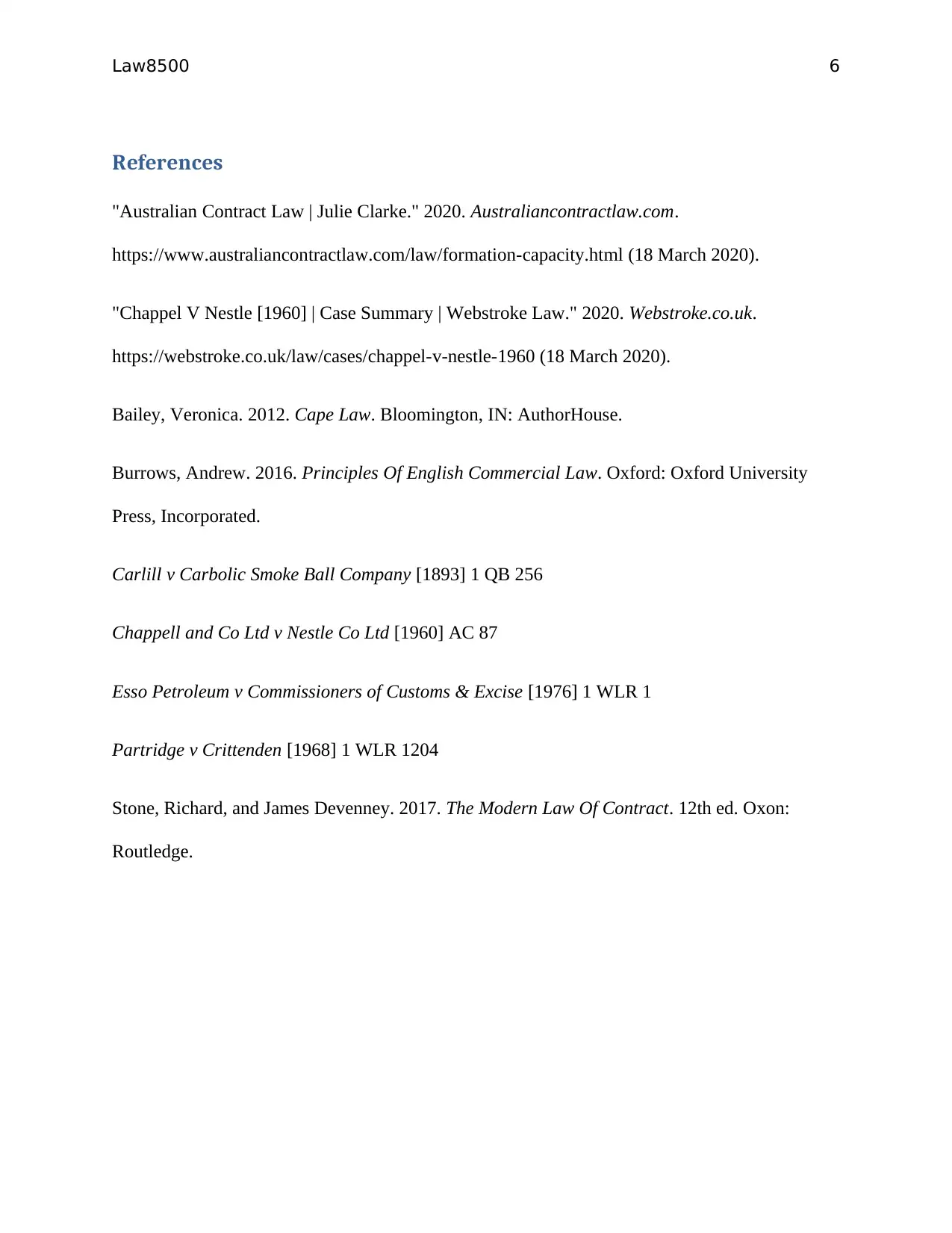
Law8500 6
References
"Australian Contract Law | Julie Clarke." 2020. Australiancontractlaw.com.
https://www.australiancontractlaw.com/law/formation-capacity.html (18 March 2020).
"Chappel V Nestle [1960] | Case Summary | Webstroke Law." 2020. Webstroke.co.uk.
https://webstroke.co.uk/law/cases/chappel-v-nestle-1960 (18 March 2020).
Bailey, Veronica. 2012. Cape Law. Bloomington, IN: AuthorHouse.
Burrows, Andrew. 2016. Principles Of English Commercial Law. Oxford: Oxford University
Press, Incorporated.
Carlill v Carbolic Smoke Ball Company [1893] 1 QB 256
Chappell and Co Ltd v Nestle Co Ltd [1960] AC 87
Esso Petroleum v Commissioners of Customs & Excise [1976] 1 WLR 1
Partridge v Crittenden [1968] 1 WLR 1204
Stone, Richard, and James Devenney. 2017. The Modern Law Of Contract. 12th ed. Oxon:
Routledge.
References
"Australian Contract Law | Julie Clarke." 2020. Australiancontractlaw.com.
https://www.australiancontractlaw.com/law/formation-capacity.html (18 March 2020).
"Chappel V Nestle [1960] | Case Summary | Webstroke Law." 2020. Webstroke.co.uk.
https://webstroke.co.uk/law/cases/chappel-v-nestle-1960 (18 March 2020).
Bailey, Veronica. 2012. Cape Law. Bloomington, IN: AuthorHouse.
Burrows, Andrew. 2016. Principles Of English Commercial Law. Oxford: Oxford University
Press, Incorporated.
Carlill v Carbolic Smoke Ball Company [1893] 1 QB 256
Chappell and Co Ltd v Nestle Co Ltd [1960] AC 87
Esso Petroleum v Commissioners of Customs & Excise [1976] 1 WLR 1
Partridge v Crittenden [1968] 1 WLR 1204
Stone, Richard, and James Devenney. 2017. The Modern Law Of Contract. 12th ed. Oxon:
Routledge.
1 out of 7
Related Documents
Your All-in-One AI-Powered Toolkit for Academic Success.
+13062052269
info@desklib.com
Available 24*7 on WhatsApp / Email
![[object Object]](/_next/static/media/star-bottom.7253800d.svg)
Unlock your academic potential
Copyright © 2020–2026 A2Z Services. All Rights Reserved. Developed and managed by ZUCOL.





